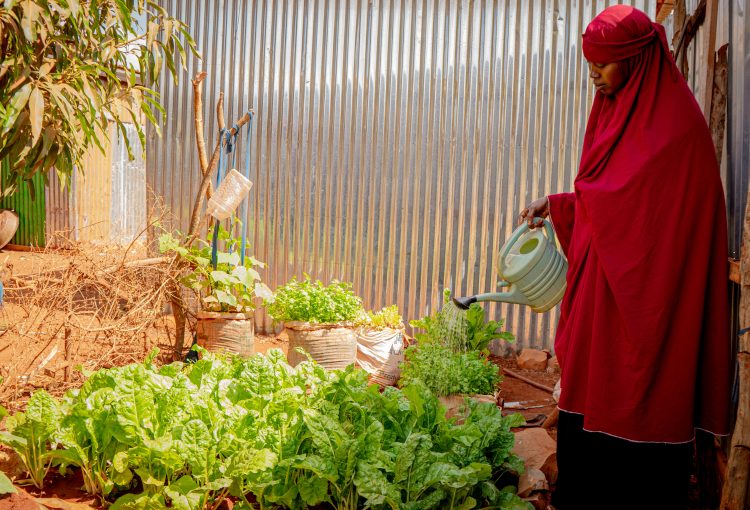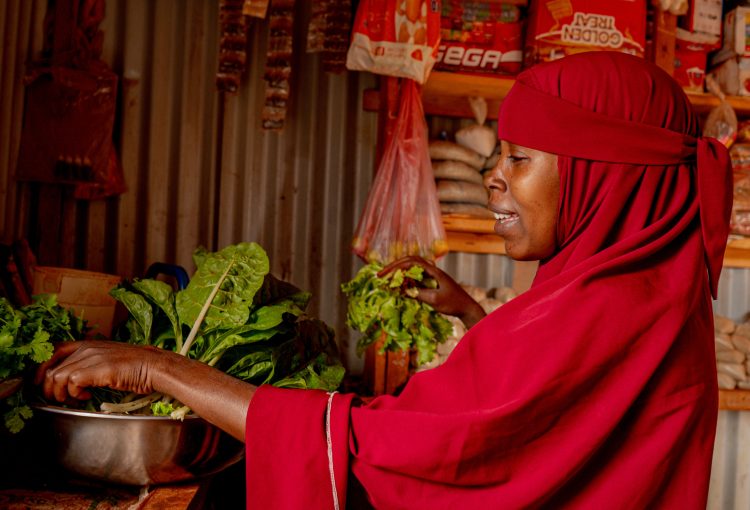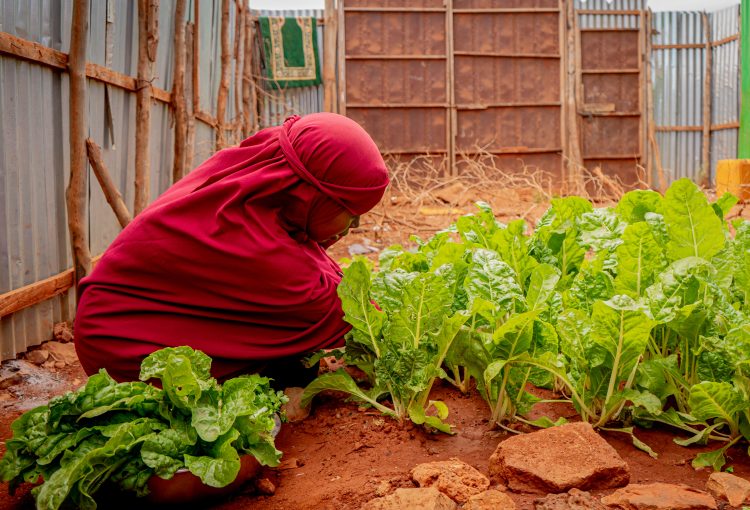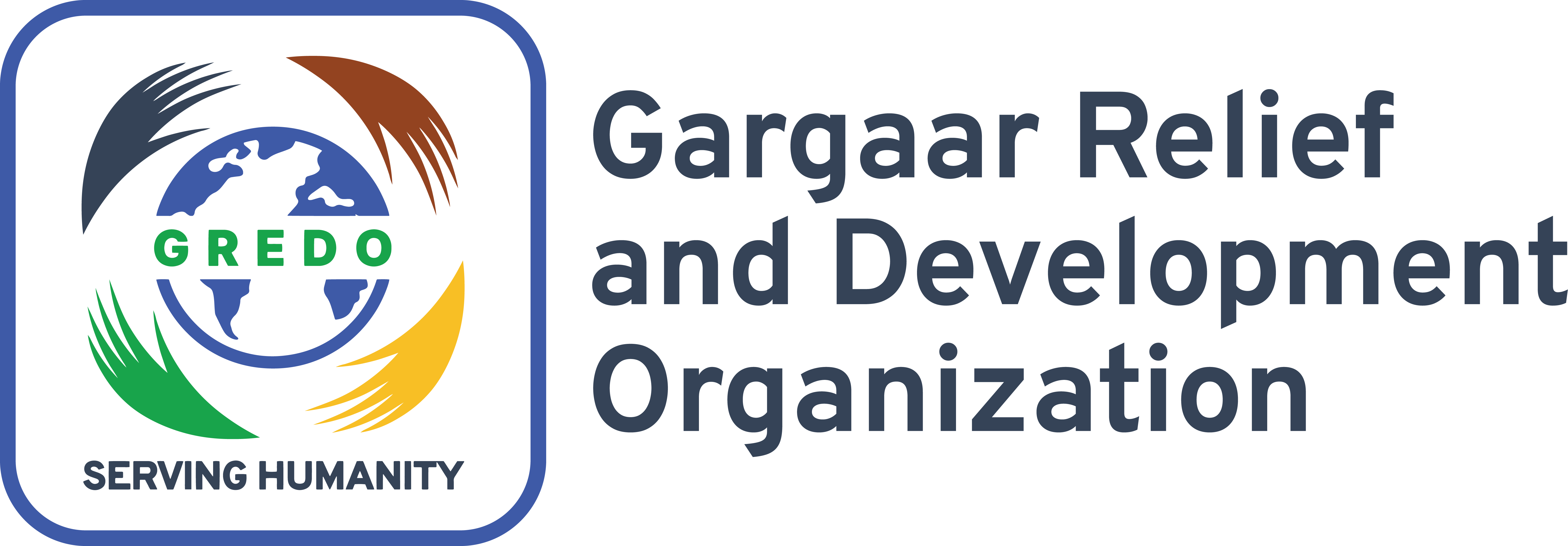“Before starting my kitchen garden, I used to depend only on food aid, but now I can feed my children from my own harvest.” Habiba Abdullahi Ibrahim
For years, 29-year-old Habiba Abdullahi Ibrahim lived with constant worry. A displaced mother of six living in the Banbusul IDP camp in Baidoa, she faced daily struggles to feed her family. Life in the camp was harsh, resources were scarce, and opportunities were almost nonexistent. Her husband had no stable work, and their survival depended largely on occasional food assistance.
Before displacement, Habiba and her husband lived in Qurunlow, 18 kilometers from Baidoa, where they relied on a small farm for their livelihood. After years of failed rains and worsening hardship, they decided to move to Baidoa in search of a better life for their children, including access to food aid, humanitarian support, and education. With limited resources, they used a donkey cart to reach Banbusul IDP camp, where they hoped to rebuild their lives after losing their farm and income.
Meals in her household were repetitive and lacked nutritional value. Sorghum porridge and tea became the daily diet, leaving her children weak and often ill. Her lastborn was born two weeks after she attended a training, yet she was determined to apply what she had learned despite her condition. Habiba felt powerless before, but she began to see hope returning to her life. “It broke my heart to see my children hungry and sick, knowing there was little I could do as a mother,” she recalls.
When GREDO, under the Somalia Joint Response (SomJR) Project, introduced kitchen gardening and climate-smart agriculture training, Habiba eagerly joined as one of the selected beneficiaries. The Practical training opened her eyes to new farming techniques, how to prepare nursery beds, manage small gardens, use compost, and grow vegetables suited to the local climate. Each participant received quality seeds and farming tools to start their own kitchen garden.
Habibaa began cultivating spinach, salad, cucumber, and coriander on a small plot within her shelter. Within weeks, the garden flourished, bringing colour and hope to her family. Her children began eating fresh vegetables daily, improving their health and energy. “Before this project, I used to depend only on food aid, but now I can feed my children from my own garden,” she says proudly.
 “Habiba watering her garden at home in Banbusul IDP camp, Baidoa,
“Habiba watering her garden at home in Banbusul IDP camp, Baidoa,
Before the training, Habibaa ran a small shop inside her home that barely sustained her family. After starting the garden, she began selling vegetables from her own harvest to stock the shop, turning it into a sustainable source of income. The farm and shop now support each other, creating stability and hope for her family’s future. With her earnings, Habibaa buys essentials like food, clothes, and school materials for her children. Her husband helps manage the shop while she tends the garden. Together, they dream of expanding their business and saving for the future. “Selling vegetables from my garden helped me buy school material for my son. That small income gave me strength and confidence,” she says. “My small shop and garden now work together to feed and support my family. I never thought a tiny patch of land could change our lives so completely.”
 “Habiba in her small shop selling vegetables.”
“Habiba in her small shop selling vegetables.”
“When I arrived at the camp, I had nothing but hope. Most days, I could only give my children porridge, and they were often sick,” Habiba recalls. “Then GREDO came with seeds, tools, and knowledge. I learned to farm even in dry soil, and when I saw green plants sprouting, I felt pure joy. The first harvest of spinach meant my children would finally eat something nourishing.”
“Today, my family eats fresh vegetables every day, and I can see the change in their health and happiness,” Habiba says proudly. “Selling some produce in my shop helps me buy essentials for my children. I no longer wait for food aid I grow food with my own hands. This garden has given me strength, dignity, and hope for a better future.
 “Habiba in her home kitchen garden, cutting fresh vegetables for a meal.”
“Habiba in her home kitchen garden, cutting fresh vegetables for a meal.”
Project Information
The Somalia Joint Response (SomJR) Project, implemented by GREDO in partnership with Oxfam and funded by the Dutch Relief Alliance (DRA), aims to enhance resilience and improve food security for vulnerable IDP and host communities in Baidoa, Southwest Somalia. The project supports 100 households with quality seeds, tools, and training in kitchen gardening and climate-smart agriculture.
Through this initiative, participants including smallholder farmers, IYCF support groups, and vulnerable women gain practical skills to produce nutritious food for their families, improve child feeding practices, and generate income from surplus produce. By reducing dependency on humanitarian aid, the project also strengthens self-reliance, social cohesion, and resilience in communities affected by displacement and climate challenges.
Habiba’s story is one of many examples showing how even a small kitchen garden can restore hope, dignity, and self-reliance to families living in fragile settings.

